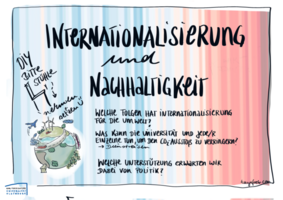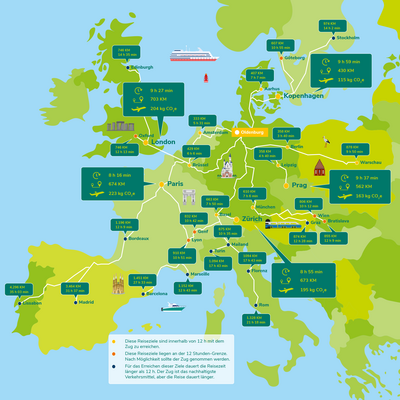International Mobility
International Mobility

With the increasing internationalisation of science, the importance of this field of action in the context of climate protection and sustainability is also growing.
The University of Oldenburg is aware of its responsibility, but also of the conflicting goals of internationalisation and climate protection, especially with regard to emission-intensive air travel to non-European partner universities, project partners and student stays abroad. For this reason, the topic of sustainability is included in the Internationalisation Strategy internationalisation strategy and students have the opportunity to choose sustainable means of transport via Green Erasmus funding for sustainable transport. For employees, there is the option of making a voluntary commitment to to avoid short-haul flights. short-haul flights. In addition, the University of Oldenburg is participating in the research project flying less as a satellite.
Greenhouse gas emissions
The area of international mobility accounted for 4.85% of the university's total emissions in 2022. 1,111 t CO2-equivalents can be attributed to international mobility. During the pandemic, the value of this area in 2020 was 580 t CO2-equivalents.
Self-commitment to renounce short-haul flights
In 2019, the University of Oldenburg initiated a self-commitment to renounce short-haul flights. This was initiated by a group of scientists in Oldenburg from Scientists for future. Members of the University of Oldenburg are invited to take part in the self-commitment and thus take responsibility for avoiding short-haul flights.
Sustainable semester abroad
Attention students: Both Erasmus+ and the University of Oldenburg promote green travel for a semester abroad. Travelling by bus, train or carpooling is supported with a grant of 100 euros and travelling by bicycle or on foot is supported with a grant of up to 350 euros .
Oldenburg University takes part in the "flying less" project
Since autumn 2022, the University of Oldenburg has been participating as a satellite in the research project flying less of the ifeu Institute. The project addresses the issue of reducing air travel in the science sector and is funded by the National Climate Protection Initiative. As a satellite in the project, the University of Oldenburg participates in workshops and surveys and can in turn draw on the project's information and communication material as well as expert advice.
Participation as a satellite therefore supports the work on this topic at the University of Oldenburg and the implementation of the climate protection concept.
Cover poster for the "Internationalization & Sustainability" event

Initiated by the then Vice President for Internationalisation, Prof. Dr. Esther Ruigendijk, an event on the topic of internationalisation and sustainability was held on 05 December 2019 in the foyer of A14 (Haarentor Campus), with a fishbowl discussion on the impact of internationalisation on the environment and possible measures.
Measures from action concept
The following list of measures in the field of action International Mobility is an excerpt from the Integrated Climate Action Concept. A more detailed view of the respective sub-measures can also be viewed there.
Strategic orientation
- Integration into internationalisation strategy
- Focus on Europe when choosing strategic partners
- Conduct a series of events on the conflict of goals between internationalisation & sustainability
Business travel
- Reduction of air travel, especially short-haul flights
- Introduction of an internal compensation mechanism for air travel
- Flights in economy class only
- Commitment to offer conferences & project meetings hybrid
Student mobility
- Strengthen counseling with a focus on Europe
- Improve communication of sustainable transport funding opportunities





